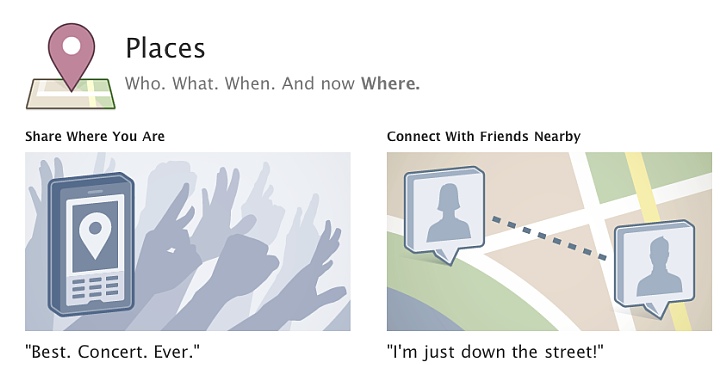That's a very good question. The hardware is there, and has been for a long term. But the two areas that need some serious TLC are the software and the user. At this weekend's BlogWorldExpo conference, three companies focussing on location in smartphones discussed where the space is going, and you know what? Nobody's really sure what's going to happen in the future, but they're all relatively confident that Facebook is going to be involved in some form for every company.
The three companies speaking were Whrrl (which is focussed on helping you discover things about the city you are in), DoubleDutch (a white-box solution so that other companies, agencies and developers can set up a location-based network) and TriOut (a hyperloaction network out of North Carolina that considers location as another 'tag' of information, and hopes to solve the problem of how to handle all this data).
As with any business, the question is how to make it bigger and drive growth. In the case of geo-location, the numbers that are going to be needed to make a successful business, rather than a cute addition to an existing network, mean that location has to break out of the relatively small number of power-users who currently use the networks and into the mainstream. That's going to require getting the message about the usefulness and the goals of location to end-users. Given that most networks have a slightly different goal, and the standard user question is “why do I want to tell everyone where I am all the time?” (irrespective of how the networks actually work, that's always the bogey-man, and it's an ever present issue), it's hard to see how this education is going to be implemented so that it benefits every company involved in the space. The biggest gorilla in the space is of course Facebook, which recently turned on their location feature. If anyone is going to educate a huge swathe of users on the benefits of mobile, it's going to be Zuckerberg's company. And Facebook Places does do that in two respects. The first is that it has kept the idea of a check-in as very simple. Nothing more than an “I am here”. More importantly it also lets you check your friends into a location – thus spreading the Places feature more widely, and having users educate other users. Hopefully those lessons will carry through to other social networks.

The privacy issues over this can be left as a debate for another time, alongside every other privacy debate that includes Facebook and sundry social networks. Another major issue is down to fatigue – both in having multiple networks looking for your location but also in ensuring your users continue to use a network in the weeks and months after the initial rush of use after the download. Again, it's an area where the answer seems to be unclear and networks are being built without a clear answer in mind as to their long term use.
The initial successes of FourSquare and Gowalla have been driven by their use of game mechanics, to try and get people to earn badges, to become the mayor of a location, all driven by earning 'power' through checking in to multiple locations multiples of times. Others are using money off coupons and vouchers to appeal to users' wallets. It's not going to be as simple as the company that can give away the most coupons, but neither can game mechanics be enough to keep the majority enthused.
The key will be to offer a potent mix of content and relevancy to the users, to the companies, and to the establishments in the location databases. The second issue is one that's been touched on before at AAS, and that is check-in fatigue. As more networks pop up, people will rationalise their behaviour to looking at one, perhaps two networks. Any new network is going to have to try and supplant these, and that's not going to be easy. As we saw historically as mobile instant messaging tried to take off, with too many networks everyone withers on the mobile platform. Providing tools that let you talk to multiple networks from one screen on your phone is fine for the geeks, but harder to pull off for a majority of users.
There's also an unspoken thought that everything is going to end up on Facebook, and people will check-in there, and if you as a smaller company can't get that check-in data out of Facebook and into your database, then there may not be a place for you at the location-based network table in the years to come.
There is a future to geo-location services – on basic logic, if you want one runaway brilliant network and five successfully average ones, then finance one hundred networks and trust in the survival of the fittest – but what they will eventually be used for, if they are going to be a component of a much larger network; if a platform-neutral federation of check-in data can be achieved... all that is unclear at the moment. The location space continues to be interesting because any idea could have a eureka moment, but it also remains a challenging space that will require risk and will see a lot of failures in 2011.
Ewan Spence, AAS
